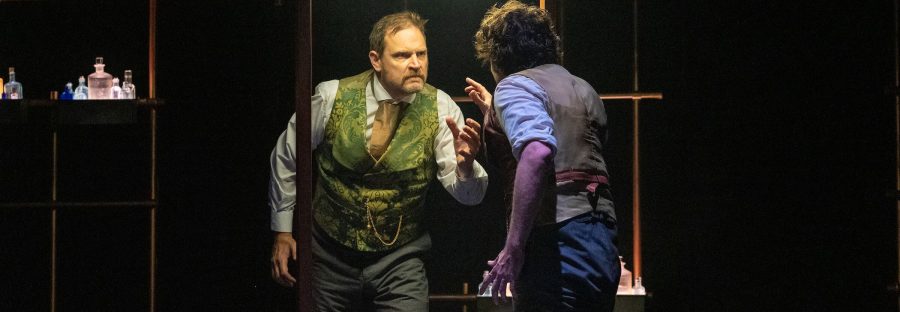Review: Storyhouse’s The Strange Case of Dr Jekyll and My Hyde
- Stage adaptation of Robert Louis Stevenson's original novella
Dr Jekyll and Mr Hyde is a landmark piece of British Literature and has been adapted dozens upon dozens of times since the original stage show in 1887, just one year after it’s original publication.
There are more than 120 film adaptations, not including stage shows and radio productions. The story has been told in countless ways by countless different actors, from being played seriously by Mel Blanc to being parodied by Jerry Lewis and Eddie Murphy.
Even Tom and Jerry and Scooby-Doo has recounted the story (Scooby-Doo did it twice, even). So in the wake of the century of adaptations, what does the Storyhouse production do to differenciate itself? Quite a bit, actually.
The story of the stageshow is largely the same as the original novella, set in the same time period, but told with only four characters – the titular Dr Jekyll, (Edward Harrison) and Mr Hyde, (Matthew Flynn), and two new female characters: Lady Gabriel, (Natasha Bain) and Rose (Rosa Hesmondhalgh).
The story is told from the perspective of the new characters, with Jekyll and Hyde’s character development shown from their interactions with them. Gabriel is a no nonsense upper-class scientist, while Rose is her niece from the countryside, unaccustomed with how women should act in the late 1880s.
They are interesting additions, furthering the theme of duality present in the original tale with their gender contrast to Jekyll and Hyde, as well as their own contrast between each other.
Rose provides more of a current-day perspective on the gender inequality featured in the time the play is set, giving the audience a character that asks the questions they might ask if they are unfamiliar with the time period differences between the late 1800s and present day.
The new characters are not flawless, however. Rose’s dialogue, while intending to be funny, sometimes misses the mark and comes off as disruptive and irritating. She’s not always like that, however – most of the time she’s perfectly fine at her best had the whole audience laughing.

The language used in the play also tries to be accurate to the period, to it’ detriment sometimes. I found some lines particularly difficult to dicipher, most memorably the lines Rose and Lady Gabriel recite at each other and Mr Hyde’s vague mutterings. At other times the lines are easily followed, and their impact is much more felt from this understanding.
One of the play’s major strengths is in the actor’s performances. The actors play their roles beautifully, with a full range of emotion on display. Nothing said feels stilted or phoned in, and the lines are complemented by very impressive physical performances from the whole cast.
Flynn’s presence feels almost undertaker-esque, with powerful, slow, hulking movements contrasted by violent bursts or energy. Harrison displays a man harrowed by fear and dread, and his struggle with Hyde, both physical and mental, is a joy to see on stage.

The stage itself is fairly empty but allows the actors a full range of movement and complements the play well. The lighting used from the lamps on stage and the overhead lights helps bring a dark, unsettling tone to the darker scenes of the story, such as Hyde’s solo scenes, and it’s brilliant to see.
The back of the stage features the only major setting prop, a wild array of pipes and metal, which is great for Jekyll’s laboratory, but perhaps not as good for the outdoor scenes,
Another great aspect of the show is the outfits. The costumes feel very period accurate and suit the characters well. The highlight of this is Rose’s outfit ,a traditional dress on the outlook, but suited with bicycle bloomers underneath, allowing her much more movements and helps symbolise her more adventurous nature much more.
Hyde’s long coat is a subtle design choice, but to a great effect, as it gives him an incredibly intimidating look.
The Storyhouse production is a great adaptation of a gothic classic. Its additions are welcome, complementing the original story rather than overshadowing it.
The acting, physical and verbal, is greatly expressed and effective. The stage allows the movements and characters to take center stage, and tell an old story with some new additions that complement it well.
Photography: Mark McNulty for Storyhouse.


